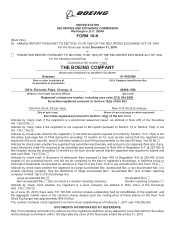Boeing 2010 Annual Report Download - page 21
Download and view the complete annual report
Please find page 21 of the 2010 Boeing annual report below. You can navigate through the pages in the report by either clicking on the pages listed below, or by using the keyword search tool below to find specific information within the annual report.upon payment for work done and commitments made at the time of termination. Modification,
curtailment or termination of one or more of our major programs or contracts could have a material
adverse effect on our results of operations and financial condition.
Our contract costs are subject to audits by U.S. government agencies. U.S. government
representatives may audit the costs we incur on our U.S. government contracts, including allocated
indirect costs. Such audits could result in adjustments to our contract costs. Any costs found to be
improperly allocated to a specific contract will not be reimbursed, and such costs already reimbursed
must be refunded. We have recorded contract revenues based upon costs we expect to realize upon
final audit. However, we do not know the outcome of any future audits and adjustments and we may be
required to reduce our revenues or profits upon completion and final negotiation of audits. If any audit
uncovers improper or illegal activities, we may be subject to civil and criminal penalties and
administrative sanctions, including termination of contracts, forfeiture of profits, suspension of
payments, fines and suspension or prohibition from doing business with the U.S. government.
Our business is subject to potential U.S. government inquiries and investigations. We are sometimes
subject to certain U.S. government inquiries and investigations due to our participation in government
contracts. Any such inquiry or investigation could potentially result in a material adverse effect on our
results of operations and financial condition.
Our U.S. government business is also subject to specific procurement regulations and other
requirements. These requirements, although customary in U.S. government contracts, increase our
performance and compliance costs. These costs might increase in the future, reducing our margins,
which could have a negative effect on our financial condition. Failure to comply with these regulations
and requirements could lead to suspension or debarment, or withholding of revenue and profit, for
cause, from U.S. government contracting or subcontracting for a period of time and could have a
negative effect on our reputation and ability to secure future U.S. government contracts.
We enter into fixed-price contracts which could subject us to losses if we have cost overruns.
Approximately 55% of BDS revenues are generated from fixed-price contracts. While firm fixed price
contracts enable us to benefit from performance improvements, cost reductions and efficiencies, they
also subject us to the risk of reduced margins or incurring losses if we are unable to achieve estimated
costs and revenues. If our estimated costs exceed our estimated price, we recognize reach-forward
losses which can significantly affect our reported results. The long term nature of many of our contracts
makes the process of estimating costs and revenues on fixed-price contracts inherently risky. Fixed-
price contracts often contain price incentives and penalties tied to performance which can be difficult to
estimate and have significant impacts on margins. In addition, some of our contracts have specific
provisions relating to cost, schedule and performance.
Fixed-price development contracts are generally subject to more uncertainty than fixed-price
production contracts. Many of these development programs have highly complex designs. If we fail to
meet the terms specified in those contracts, our sales price could be reduced. As technical or quality
issues arise, we may experience schedule delays and higher costs to complete, which would adversely
affect our financial condition. Examples of significant BDS fixed-price development contracts include
AEW&C, KC-767 International Tanker, P-8I and commercial and military satellites.
We enter into cost-type contracts which also carry risks.
Approximately 45% of BDS revenues are generated from cost-type contracting arrangements. Some of
these are development programs that have complex design and technical challenges. These cost-type
programs typically have award or incentive fees that are subject to uncertainty and may be earned over
9
























